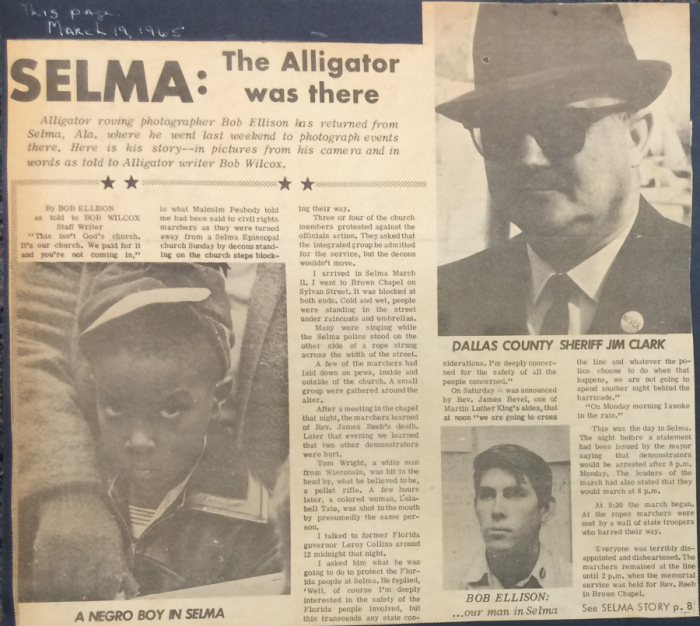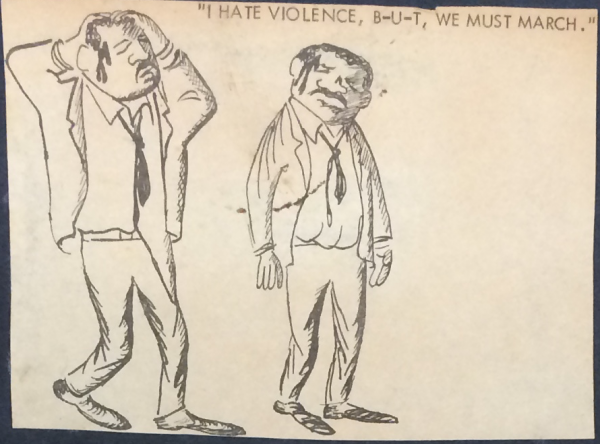by Justin Dunnavant, AAHP Graduate Coordinator
This year marks the 50th anniversary of the infamous march in Selma, Alabama and with the recent release of the movie “Selma,” we thought it would be appropriate to compile a digital exhibit highlighting the connections between UF and the Selma march. The following articles and images from the Alligator were donated by Mr. Dan Harmeling and are housed in the Samuel Proctor Oral History Program (SPOHP) in Pugh Hall.
 In March of 1965, five UF students affiliated with the Freedom Forum on campus [Judie Harman, Lynn Dacey, Carrol Richardson, Dana Swann, and David Purviance] joined by Alligator photographer, Bob Ellison, traveled to Selma, Alabama to support the demonstrations. Four of the five students dropped out of university to attend. Their sentiments were reflected in a statement by the Freedom Forum secretary, Marilyn Sokolof.
In March of 1965, five UF students affiliated with the Freedom Forum on campus [Judie Harman, Lynn Dacey, Carrol Richardson, Dana Swann, and David Purviance] joined by Alligator photographer, Bob Ellison, traveled to Selma, Alabama to support the demonstrations. Four of the five students dropped out of university to attend. Their sentiments were reflected in a statement by the Freedom Forum secretary, Marilyn Sokolof.
We as students of the University of Florida, feel ashamed that such atrocities can go on within the United States. We feel we cannot sit by and just watch these things happen. That’s why some of us have gone to Selma.
-Marilyn Sokolof
On campus, the Student Group for Equal Rights (SGER) worked hard to educate students on campus about the situation in Selma. In solidarity with the Selma marchers, SGER organized a vigil march to the Federal Post Office in downtown Gainesville.
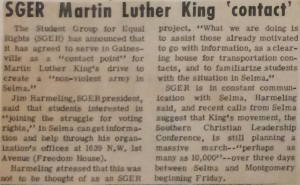
Bob Ellison summarized his experience as a UF student and photographer in his front page article, “Selma: The Alligator was there.”
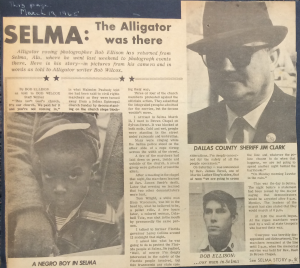
The Alligator covered the unfolding events in Selma almost daily, events which sparked a volley of descent and rebuttal in their editorial section.
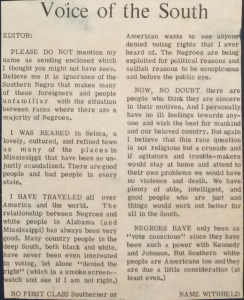
Some spoke out strongly against the actions of Reverend Martin Luther King, Jr. reproaching him for “provoking” the violence brought upon the marchers. It was said that the relationships between blacks and whites in Alabama was generally peaceful and the town was unjustly scrutinized. Some even went as far as to say that many people in the deep South–blacks and whites–have never really been interested in voting.
In opposition to these statements, others wrote in support of the Selma marchers and the demonstrations. They defended the non-violent actions and accused the previous authors of victim blaming.
The events in Selma had national reverberations and students at the University of Florida became directly involved in the movement. For many African Americans in Florida, the voter discrimination, intimation and violence evident in Alabama were part of their day-to-day realities in Florida.
For additional information about this and other collections, contact SPOHP, call the offices at (352) 392-7168, and connect with us online today. For inquiries related to web content, e-mail Diana Dombrowski.
